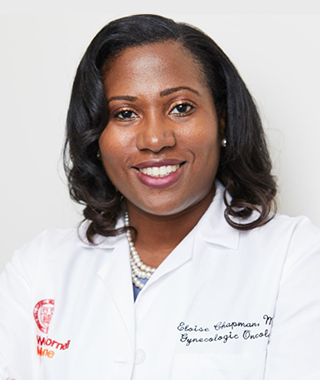6 Symptoms of Uterine, Ovarian, and Cervical Cancer You Shouldn’t Ignore
A guide to when potential signs of gynecologic cancers, such as bloating and heavy bleeding, warrant a closer look.

The signs of uterine (or endometrial), ovarian, and cervical cancers, the most common gynecologic cancers, can be subtle and vague. Symptoms such as painful intercourse, unusual discharge, and bleeding after menopause are often confused with other medical issues, making it hard to catch cancers early when the chances of successful treatment are best.
“It’s important to be mindful of how your body feels to you and to trust yourself,” says Dr. Eloise Chapman-Davis, director of gynecologic oncology at NewYork-Presbyterian/Weill Cornell Medical Center.
Dr. Chapman, who is also an associate professor of obstetrics and gynecology at Weill Cornell Medicine, recommends staying alert to these symptoms of common gynecologic cancers and seeing a gynecologist if you experience any of them:

Dr. Eloise Chapman-Davis
Irregular bleeding
Many factors, such as stress and weight loss, can throw off your menstrual cycle from time to time, causing changes to your period. But if you are consistently spotting between normal periods or experiencing heavier than usual bleeding, you should tell your gynecologist. Irregular bleeding can be a sign of uterine, ovarian, or cervical cancer.
During perimenopause, when ovaries gradually produce less hormones in the transition to menopause, spotting or irregular periods also are common. But if a skipped period is followed by two or three weeks of heavy bleeding, “that could mean that blood is building up in your uterus, a risk factor for uterine cancer,” Dr. Chapman says. Fortunately, she adds, “if you see your gynecologist as soon as you recognize bleeding, most of the time it’s going to be stage 1.”
With cervical cancer, bleeding after intercourse is common. “It makes sense,” says Dr. Chapman. “There’s pressure on a mass and all of a sudden you’re bleeding.”
To check for cancer when there’s irregular bleeding, doctors typically perform a pelvic ultrasound and a biopsy. “A pelvic exam is also important,” Dr. Chapman adds. “And that may also include getting a Pap smear to screen for cervical cancer.”
Bleeding after menopause
Any bleeding after menopause, defined as the absence of periods for 12 consecutive months, should be checked out. “Whether you have a spot of blood or heavy bleeding, that’s often abnormal and can be a sign of uterine or cervical cancer,” says Dr. Chapman. “Some people will say, ‘I stopped my period and then it came back.’ But there’s no such thing.”
“After menopause people may see a drop of blood when they wipe and sometimes that leads to a late diagnosis because they thought it was associated with, say, a urinary tract infection or hemorrhoids, and they ignore it,” says Dr. Chapman. “The only way to know is to investigate exactly where that blood is coming from.”
Pelvic pressure or pain
A tumor or growth on the uterus or ovaries can cause compression on the nearby organs, including the bladder and rectum, resulting in a feeling of pressure or even pain in the pelvic area, abdomen, or back. “Sometimes the pain can feel as simple as menstrual crampy pain,” Dr. Chapman says. “Sometimes it can be back pain because a mass is sitting behind your uterus.”
The pressure from a tumor also can cause changes in bladder and bowel habits, including constipation, urinary incontinence, or feeling an increased urgency to urinate.
As these conditions could be pelvic floor disorders or other non-cancer-related issues, the key things to ask are, “Is this something that is new to you? And is it chronic, meaning that it has not disappeared after two to three weeks?” says Dr. Chapman. “If it’s changed from what your normal is and it’s not going away, then you should definitely have it evaluated.”
Gastrointestinal issues
GI problems like irritable bowel syndrome (chronic diarrhea or constipation and discomfort) can cause bloating, but it could also be a sign of cancer. “Another common sign that patients talk about is feeling full pretty quickly after you eat,” Dr. Chapman says. “If you’re having bloating and early satiety, that can be concerning, specifically for ovarian cancer.” If such symptoms go on for more than a month, see a doctor, Dr. Chapman advises.
Unusual vaginal discharge
Continuous discharge could be a sign of several gynecologic cancers. “The cervix makes a lot of mucus,” says Dr. Chapman. “So discharge is normal. But if it’s happening not just around your periods, but all the time, including after sex, it should get evaluated. You should not assume that this is just what happens with your body.”
In older women who have stopped having discharge and then all of a sudden start again, “that is sometimes a sign of cancer,” says Dr. Chapman.
Itchy, burning discharge, which is usually due to a yeast or other infection, is typically not a sign of cancer, Dr. Chapman says. But be sure to let your doctor know as you still need treatment.
Painful intercourse
Pain during sex has many possible causes, including benign growths called fibroids, endometriosis (when endometrial-like tissue migrates outside the uterus), and conditions like vaginismus (when vaginal muscles contract involuntarily, causing pain with intercourse). Older women may have discomfort due to dry, thinning vaginal tissue.
“But if you’ve had no pain before with intercourse and all of a sudden this is going on, you want to rule out other causes,” says Dr. Chapman. The check typically includes a pelvic exam and ultrasound.
Dr. Chapman adds that people often dismiss painful sex as a part of aging. “It can happen with age, but it also can happen with cancer,” she says. “So it’s better not to ignore it.”
How To Prevent Gynecologic Cancer
Here are ways to help prevent gynecologic cancer or catch it early.
Get up-to-date with doctor visits.
Many people get off track with checkups and screenings. Others simply stop getting pelvic exams after their childbearing years. But sometimes an early-stage cancer can be felt with such exams, including among patients who are 70 and older (people with the highest risk for some gynecologic cancers), says Dr. Chapman. Cervical cancer screenings also are important, including for older people who have new sexual partners.
Ask for the HPV vaccine.
The HPV vaccine is recommended for children ages 9 to 12, before they have been exposed to the virus. But the FDA has approved this cancer-prevention shot up to age 45. Although it may not be as effective as it is in those who get the shot when they are young, it can provide some protection against cervical cancer, as well as head, neck, and throat cancers, Dr. Chapman says, so discuss it with your doctor.
Tell your doctor your family cancer history.
If breast or gynecologic cancers run in your family, consider genetic testing. For example, people with certain genetic mutations, like BRCA 1 and BRCA 2, have a greater risk for ovarian as well as breast cancer. Those with Lynch syndrome have an increased risk for ovarian and uterine cancer. If your family history includes these cancers, your doctor may do more frequent screenings and discuss options that can lower your risk of getting cancer.
Trust yourself and speak up.
You know your body better than anyone, says Dr. Chapman. “Stay in tune with your body,” she says, and raise with your doctor anything that’s unusual for you. Make sure you are a strong self-advocate and that your questions are answered and your concerns addressed. “It’s important to be persistent.”
Additional Resources
Learn more about women’s health at NewYork-Presbyterian.
Eloise Chapman-Davis, M.D., is director of the Division of Gynecologic Oncology at NewYork-Presbyterian/Weill Cornell Medical Center and Weill Cornell Medicine and an associate professor in obstetrics and gynecology and a member of the Sandra and Edward Meyer Cancer Center at Weill Cornell Medicine. She focuses on early detection and prevention strategies for people at high risk for ovarian and uterine cancers and HPV-related diseases. She is actively involved in clinical and translational research evaluating gynecologic cancer outcomes through clinical trial development with an emphasis on healthcare disparities.

